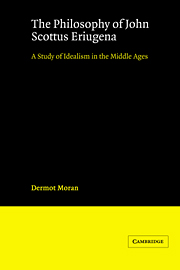Book contents
- Frontmatter
- Contents
- Preface
- Acknowledgments
- Chronology
- List of abbreviations
- 1 European intellectual culture in the ninth century
- 2 The predestination debate
- 3 Eriugena's life and early writings
- 4 The Greek awakening
- 5 The Periphyseon
- 6 Eriugena as philosopher
- 7 Eriugena's sources
- 8 Dialectic, philosophy, and the life of the mind
- 9 The meaning of human nature
- 10 Self-knowledge and self-definition: the nature of human knowing
- 11 The meaning of non-being
- 12 The meaning of nature
- 13 Eriugena's influence on later mediaeval philosophy
- 14 Conclusion
- Bibliography
- Index nominum
- Index rerum
10 - Self-knowledge and self-definition: the nature of human knowing
Published online by Cambridge University Press: 05 June 2012
- Frontmatter
- Contents
- Preface
- Acknowledgments
- Chronology
- List of abbreviations
- 1 European intellectual culture in the ninth century
- 2 The predestination debate
- 3 Eriugena's life and early writings
- 4 The Greek awakening
- 5 The Periphyseon
- 6 Eriugena as philosopher
- 7 Eriugena's sources
- 8 Dialectic, philosophy, and the life of the mind
- 9 The meaning of human nature
- 10 Self-knowledge and self-definition: the nature of human knowing
- 11 The meaning of non-being
- 12 The meaning of nature
- 13 Eriugena's influence on later mediaeval philosophy
- 14 Conclusion
- Bibliography
- Index nominum
- Index rerum
Summary
Idealist philosophy (e.g., that of Fichte, Schelling, or Hegel) develops from the expansion of the concept of Cartesian self-aware subjectivity into the concept of an infinite and free, self-positing Absolute Subject. Eriugena's relationship to idealism, therefore, must be examined from the point of view of his understanding of the meaning of infinite subjectivity as the essential nature of both God and man. For Eriugena, God's self-knowledge is expressed through human knowledge, and human self-knowledge is possible only because humans can become one with their idea in God's knowledge.
In the preceding chapter we examined human nature from two points of view: under the aspect of its ideal nature and under the aspect of its present dimension in space-time (e.g., IV.776c–d). We saw how the ideal nature can be said to be omniscient, that is, to know all things and to know itself perfectly; while the soul, in its present state in space-time and in the body, has an imperfect knowledge of its surroundings and of itself, that is, of its true nature.
In this chapter we shall examine Eriugena's own complicated discussion of the relation between the knowledge of the self as it now presents itself and the ideal knowledge of the perfect self. In particular, we shall be examining this from the point of view of self-knowledge: That is, what happens when the self's object of knowledge is the human self?
- Type
- Chapter
- Information
- The Philosophy of John Scottus EriugenaA Study of Idealism in the Middle Ages, pp. 186 - 211Publisher: Cambridge University PressPrint publication year: 1989



